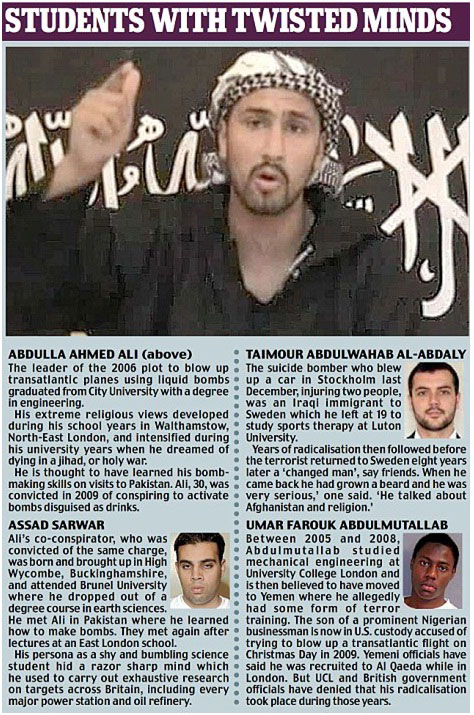By JAMES SLACK, HOME AFFAIRS EDITOR, The Daily Mail, London
Last updated at 10:30 AM on 6th June 2011

England's universities have become a breeding ground for extremism and terrorist recruitment, according to a disturbing government report.
Officials have identified 40 English universities where ‘there may be particular risk of radicalisation or recruitment on campus’.
A soon to be published Whitehall report – seen by the Daily Mail – will point to a string of examples of students going on to commit terrorist acts against this country or overseas.
Alarmingly the Prevent review says that ‘more than 30 per cent of people convicted for Al Qaeda-associated terrorist offences in the UK... are known to have attended university or a higher education institution.
‘Another 15 per cent studied or achieved a vocational or further education qualification. About 10 per cent of the sample were students at the time when they were charged or the incident for which they were convicted took place.’
• New crackdown on home-grown terror will broaden definition of Islamic 'extremism'
• Terrorists 'could lace British food with poison': Government's terrifying warning to supermarkets
The report, prepared by Home Office officials, warns of hardline Islamic groups specifically targeting universities which have large numbers of Muslim students in order to peddle a message of hate.
Students are even ‘engaging in terrorism or related activities while members of university societies’.
But it says the universities are not doing enough to respond to this threat to national security. Fewer than half of universities are engaged with the police.
Target: Brunel University in West London has been named in the report
Home Secretary Theresa May will demand universities do more to confront this threat. She also wants more action to deport preachers of hate.
The universities which have given places to fanatics include some of our most prestigious institutions.
The report will say that terrorists who have attended English universities include Taimour Abdulwahab al-Abdaly, the Stockholm suicide bomber who had a BSc in sports therapy from the University of Luton, now the University of Bedfordshire.
The alleged Detroit underpants bomber, Umar Farouk Abdulmutallab, studied mechanical engineering at University College London between 2005 and 2008.
Two of the fanatics convicted of the transatlantic liquid bomb plot – ringleader Abdulla Ahmed Ali and Assad Sarwar – attended City and Brunel Universities respectively.
The review says the Department for Business, which is in charge of universities, has identified about 40 English universities where there may be a particular risk.
Some now have a dedicated police officer to advise on tackling radicalisation.The document raises particular alarm about the Federation of Student Islamic Societies (FOSIS).
It says there are ‘several examples of students engaging in terrorism or related activities while members of university societies affiliated to FOSIS.
Such extremists must have no part in any organisation that wishes to be recognised as a representative body.’
The finger of blame for radicalising students is pointed at Hizb-ut-Tahrir, which David Cameron promised to ban in opposition, and off-shoots of a fanatical group once run by preacher of hate Omar Bakri.
Blamed: Extremist group Hizb ut-Tahrir has been blamed for radicalising students
One section warns: ‘We believe there is unambiguous evidence to indicate that some extremist organisations, notably Hizb-ut-Tahrir, target specific universities and colleges (notably those with a large number of Muslim students) with the objective of radicalising and recruiting students.’
Universities UK says that universities ‘are places where ideas and beliefs can be tested without fear of control’, and that they act as a safeguard against ideologies that threaten Britain’s open society.
The worries about the lax attitude of some universities is combined with concern about the student visa route.
Ten of the 11 Pakistani nationals seized on suspicion of plotting an atrocity in the North-West in 2009 had student visas.
The alleged ringleader of this plot – Abid Naseer – was a computer studies student at Liverpool John Moores University.
Mrs May is determined to crack down on the abuse of the student visa route.
However, she has faced opposition within government from Michael Gove’s Education Department and Business Secretary Vince Cable.
Meanwhile, Whitehall officials are said to be concerned that Mr Gove’s flagship ‘free schools’ policy – where parents can obtain state funding to open and run their own schools – could be targeted by extremists.
Security officials working in a dedicated unit are expected to vet the backgrounds of all would-be applicants for evidence of extremism or radicalisation.
The Prevent strategy is said to have caused behind-the-scenes rows within the Government.
Mr Gove is understood to have argued that the Government should not engage with groups which hold any extremist beliefs – even though these are the ones most likely to attract would-be terrorists.
Four months ago, in a major speech in Munich, the Prime Minister signalled an end to ‘passive tolerance’ of extremist Islamic organisations which foster hatred against the West and radicalise young Muslims.
---
New Crackdown on Home-grown Terror will Broaden Definition of Islamic 'Extremism'
By DAILY MAIL REPORTER
Last updated at 7:00 PM on 5th June 2011
Getting tough: Prime Minister David Cameron says extremist group should not be supported
Muslim groups applying for government funding will have to prove they do not support extremist views, under new counter-terrorism regulations.
Home Secretary Theresa May is this week set to unveil a fresh crackdown on home-grown terror in a bid to stop the promotion of Islamic radicalism in Britain.
The new Prevent strategy will classify any group as extremist if they fail 'to reflect British mainstream values' - even if they do not advocate violence, according to the Observer.
'There will be a direct challenge to these [non-violent] groups,' a Home Office source told the newspaper.
The get-tough policy is seen as a victory for Prime Minister David Cameron, who has repeatedly argued that violent extremism is often nourished by non-violent groups.
But the hardline approach has been opposed by key Cabinet members - including Deputy Prime Minister Nick Clegg, Tory chairman Baroness Warsi and attorney general Dominic Grieve.
Mr Clegg has previously called for a more tolerant attitude to Muslim groups, arguing that dialogue with non-violent extremists can stem the threat of violent extremism.
• Theresa May and Michael Gove at war over crackdown on home-grown terror
But in a speech in February, Mr Cameron signalled an end to the ‘passive tolerance’ of extremist Islamic organisations who foster hatred against the West and radicalise young Muslims.
Overruled: Deputy Prime Minister Nick Clegg (left) and Tory chairman Baroness Warsi opposed the new measures
Arguing that state multiculturalism had failed, he said: 'Move along the spectrum and you will find people who may reject violence, but who accept various parts of the extremist world view, including real hostility towards western democracy and liberal values.'
One of the main themes of the revised strategy will be combating ‘radicalisation in universities’ – the fear that extremists are brain-washing British-born Muslim students and that university bosses are failing to challenge extreme political views.
Another Whitehall source said: 'You will see he [Mr Cameron] has a very clear view of how the nation should be dealing with extremism. It’s a rather different perspective from the previous Government’s strategy because if focuses more on extremism than merely terrorism.’
According to the Observer, Muslim groups will now only receive public funds for short term projects after proving they do not promote or condone extremist views.
'Under the old Prevent strategy we sprayed a lot of cash willy-nilly and the new strategy is opposed to that,' the source told the newspaper.
--------
Terrorists 'could lace British food with poison': Government's terrifying warning to supermarkets
By DAILY MAIL REPORTER
Last updated at 3:48 PM on 5th June 2011
The government has warned supermarkets that terrorists could poison food supplies in Britain.
Security advisers have highlighted the vulnerability of the country's food chain and how quickly bacteria can spread.
Manufacturers and retailers have been told they could be at risk from groups looking to cause widespread casualties and disruption.
Threat: Supermarkets have been told to tighten security due to concerns that food and drink supplies may be targeted by terrorists.
Across the board, food and drinks producers, suppliers and supermarkets have been told to tighten security throughout their food production processes and target weaknesses in their supply chains.
In the past the biggest risk to food has been from criminals attempting extortion or people with a grudge.
However, Al Qaeda, dissident republicans in Northern Ireland and animal rights activists are being identified as potential risks.
An official from the Centre for the Protection of National Infrastructure spoke at a meeting of food safety experts.
• Theresa May and Michael Gove at war over crackdown on home-grown terror
• E.coli probe switches to restaurant and festival in Germany as deaths rise to 19
• 'He loved his children with all his heart and soul': Wife of British soldier shot dead in Afghanistan pays tribute to her husband
He said: The UK suffers from a low level of malicious contamination of food by the bad, the mad and the sad.
'Now it has to consider the possibility of food supplies being disrupted by politically motivated groups.'
Fears have been exacerbated by the outbreak of a highly virulent strain of E.Coli in Germany which is believed to have been caused by poor hygiene at a farm, in transit or at a food outlet.
A senior German doctor last night called for an investigation into the possibility that the bacteria had been spread deliberately.
Risk: Food supplies in supermarkets could be contaminated by extremist groups such as Al Qaeda
Klaus-Dieter Zastrow, chief doctor for hygiene at Berlin’s Vivantes hospital, said: 'It’s quite possible that there’s a crazy person out there who thinks "I’ll kill a few people or give 10,000 people diarrhoea".
'It’s a negligent mistake not to investigate in that direction,' he told the Sunday Telegraph.
Potential attacks include the possibility of contaminating prepared food or drink with bacteria and chemicals or targeting basic ingredients used in large numbers of foods.
The dairy industry is one of the biggest markets at risk because just a few grams of ricin in a tanker could kill thousands of people.
Foreign food presents an even higher risk, the CPNI said, because its security cannot be guaranteed and such attacks could cause severe economic harm.
In the past a pastry producer was targeted when peanuts were put into a nut-free product closing a factory for five days and prompting a product recall. Police ruled out accidental causes, leading the company to losing five per cent of annual sales.
In another case, a South African farmer who believed that Britain was behind losses in Zimbabwe's farming industry allegedly threatened to unleash foot and mouth disease in the UK.
The CPNI goes on to warn that the threat is unlikely to decline in the future and suggests checks are made on visiting contractors and new workers.
It also said producers should look at introducing perimeter controls and increase security to fight against 'bioterrorism'.
Source: The Daily Mail, London
URL: http://newageislam.com/NewAgeIslamIslamTerrorismJihad_1.aspx?ArticleID=4783




 England's universities have become a breeding ground for extremism and terrorist recruitment, according to a disturbing government report. Officials have identified 40 English universities where ‘there may be particular risk of radicalisation or recruitment on campus’.
England's universities have become a breeding ground for extremism and terrorist recruitment, according to a disturbing government report. Officials have identified 40 English universities where ‘there may be particular risk of radicalisation or recruitment on campus’.
 Moderate Islamist here
Moderate Islamist here


0 comments:
Post a Comment